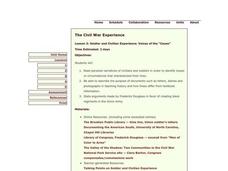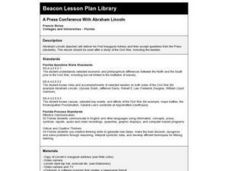Curated OER
Perspective on the Slave Narrative
Students examine narratives of two slaves: iam W. Brown and Frederick Douglas. They produce an essay explaining how Brown's narrative challenged the prejudices of readers in his own time and how it challenges prejudices today.
Curated OER
Frederick Douglass
Students identify three important aspects of slave life and describe important events in the life of Frederick Douglass. They identify at least two contributions made by Frederick Douglas.
Curated OER
America responds to Dred Scott
Eleventh graders examine the reactions Americans had to the Dred Scott decision. In this American History lesson, 11th graders read editorials from newspapers. Students analyze these editorials and audio tapes from that time.
Curated OER
Social Studies: Underground Railroad
Young scholars role-play as escaped slaves making their way from North Carolina to Canada, stopping in Indiana. They track their journeys on maps and include a stop at Harriet Tubman's. Students write three paragraphs about how Tubman...
Curated OER
The Civil War Experience
Eighth graders study the Civil War. In this Civil War instructional activity, 8th graders read and analyze primary sources. Students complete handouts in relation to the primary sources.
Curated OER
Frederick Douglass: This is Your Life; The Abolitionist
Seventh graders study the abolitionist movement in antebellum America.
Curated OER
The Literature of Upheaval
In groups, 8th graders read different documents and answer questions on the Civil War period. Students read documents by Thoreau, Stowe and Frederick Douglas.
National Endowment for the Humanities
Slavery and the American Founding: The "Inconsistency Not to Be Excused"
High schoolers examine slavery in the revolutionary and colonial eras of the United States. In this slavery lesson, students investigate the presence of slavery in early America, the language of the Constitution, and the intent of the...
Curated OER
Abraham Lincoln, the 1860 Election, and the Future of the American Union and Slavery
High schoolers examine Abraham Lincoln's political views about slavery. In this American Civil War lesson, students determine how Lincoln's beliefs led to the restriction of slavery in American territories. Student also analyze the party...
Curated OER
The People of the Civil War
Fifth graders complete a two week unit on the American Civil War. They complete a Venn diagram, watch a video, make butter, write journal entries, write a letter to a Civil War leader, and create a newspaper.
Curated OER
Amazing Speeches
Students study the speeches of Frederick Douglas, Abraham Lincoln, and Chief Joseph. Students write a story set during the Nineteenth Century Era. Students present their story to the class. Handouts and worksheets are included in the...
Curated OER
Activists for Human Rights
Young scholars research prominent human rights activists from U.S. history. They report the biographical facts of their subject along with information on the causes he or she represented. Students also examine local human rights issues...
Curated OER
A Press Conference With Abraham Lincoln
Fifth graders hold a press conference with Abraham Lincoln.
Curated OER
Civil War Prison Camps
Fourth graders work with a partner to create a puppet show that demonstrates the condition of the prisoners in Andersonville, Georgia during the Civil War.
Curated OER
Inspiring Freedom: The Remond Family and Abolitionism in Salem
Students examine the abolitionist movement in Salem. Exploring the contributions of the Remond family, they identify how they made the issue one of national and international importance. They discuss the views of the south and how...
















